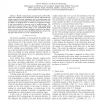Free Online Productivity Tools
i2Speak
i2Symbol
i2OCR
iTex2Img
iWeb2Print
iWeb2Shot
i2Type
iPdf2Split
iPdf2Merge
i2Bopomofo
i2Arabic
i2Style
i2Image
i2PDF
iLatex2Rtf
Sci2ools
GLOBECOM
2006
IEEE
2006
IEEE
Group-Based Block Linear Successive Interference Cancellation For DS-CDMA
— Mobile communication systems based on DS-CDMA suffer from multiple access interference (MAI), which limits the system capacity. Several techniques, such as beamforming with multiple antennas and multiuser detection (MUD), have proved to be effective to mitigate MAI. To reduce the complexity of MUD, it has been proposed to process users in smaller groups. The interference between group is then reduced using beamforming with smart antennas. In this paper, a new group-based block linear successive interference cancellation structure is developed. The structure is shown to provide BER performance close to the full space-time MUD at a lower computational cost.
Beamforming | GLOBECOM 2006 | Multiple Access Interference | Successive Interference Cancellation | Telecommunications |
| Added | 11 Jun 2010 |
| Updated | 11 Jun 2010 |
| Type | Conference |
| Year | 2006 |
| Where | GLOBECOM |
| Authors | Benoit Pelletier, Benoît Champagne |
Comments (0)

